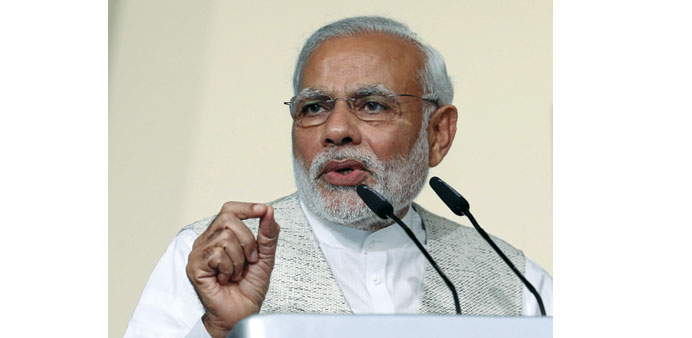Modi: Facing a higher wage bill.
Bloomberg
New Delhi
A proposal to increase the salaries of millions of Indian civil servants risks derailing the government’s budget deficit goal, adding to pressure on bonds suffering the biggest outflows since May.
The 23.55% overall boost recommended by a government-appointed panel on November 19 would cost the exchequer Rs1.02tn ($15.4bn) in the year starting April 1, Finance Minister Arun Jaitley estimates. Such a raise, along with increased economic stimulus spending, would make it harder to meet fiscal targets, Fitch Ratings said.
“I don’t feel confident that the government will succeed in meeting its deficit target,” said Kunal Kundu, an economist with Societe Generale in Bengaluru. “There will be pressure on bonds.” Prime Minister Narendra Modi’s government, which in February pushed back its deadline for fiscal consolidation by a year to March 2018, faces a higher wage bill just as a sluggish economy and dwindling asset sales are weighing on revenue. The pay increases also threaten to fuel inflation, limiting room for central bank governor Raghuram Rajan to add to this year’s four interest-rate cuts.
“With the expectation of increased government spending in the coming years, a question for the next budget will be whether the government will stick to its consolidation path,” said Thomas Rookmaaker, a sovereign analyst at Fitch in Hong Kong.
“We’ve hardly seen any policy initiatives that would lead to a structurally higher government revenue intake.” Government bonds fell after the pay panel’s proposals were announced on Thursday, pushing up the benchmark 10-year yield by three basis points the following day. The yield rose one basis point on Monday to 7.71%, set for its highest close since November 9. Societe Generale expects it to climb to 7.75% by the end of March, according to Kundu, compared with an earlier forecast of 7.25% and the 7.33% median estimate of analysts surveyed by Bloomberg.
The yield on notes maturing May 2025 has risen seven basis points this month as foreign holdings of rupee-denominated notes fell by Rs30.5bn through November 20, the most since May, according to the National Securities Depository. Overseas ownership reached a record Rs3.56tn on October 26.
Jaitley said in February the goal of reducing the deficit to 3% of gross domestic product will be reached in the year ending March 2018, instead of March 2017. The government aims to narrow the shortfall to 3.9% by March 2016 and to 3.5% the following year.
Taking the pay increases into account, Morgan Stanley expects the gap to be 3.9% by March 2017 and Deutsche Bank sees the following year’s deficit at 3.7%. The government is confident of maintaining the fiscal consolidation path, Shaktikanta Das, economic affairs secretary in the finance ministry in New Delhi, told Bloomberg TV India. India’s sovereign bonds have returned 7.8% this year, the most in Asia, according to indexes compiled by Bloomberg. PNB Gilts expects the notes to extend gains as a slump in global commodities keeps inflation in check and inflows will increase when the government increases limits on foreign holdings next year.
“The strain due to higher salaries will be neutralised because there will be a jump in consumer spending, which means higher GDP growth and revenue,” said Vijay Sharma, executive vice president for fixed income at PNB Gilts in New Delhi. He predicts the 10-year yield will drop to 7.45% by March 31.
The pay changes suggested would take effect on January 1 and benefit as many as 4.7mn workers and about 5.2mn pensioners. While staff pay is adjusted for inflation every six months, fixed salaries are revised once in about 10 years. India spent a net Rs221bn when it last raised salaries following the 2008 recommendation for a raise of as much as 40%.
“With this additional expenditure, the fiscal deficit may be larger than currently foreshadowed,” said Kyran Curry, director of sovereign ratings at Standard & Poor’s in Singapore.
That may stand in the way of upgrades, he said. S&P and Fitch rate India’s debt at BBB-, the lowest investment grade, with a stable outlook. Moody’s Investors Service has a similar ranking of Baa3 with a positive outlook.
“Fiscal challenges are a key constraint on India’s sovereign credit profile,” said Atsi Sheth, senior vice president for sovereign risk at Moody’s in Singapore. “Government finances are vulnerable to slower-than-anticipated nominal growth as well as spikes in expenses, such as those related to pay adjustments.”

